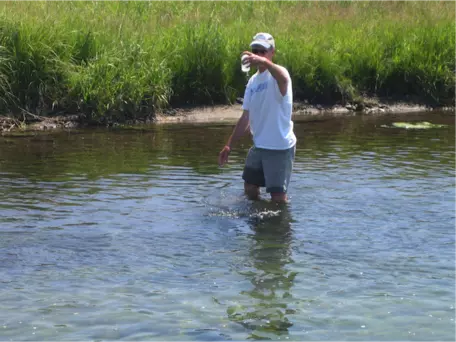Nanoscience in the Earth and Environmental Sciences—Research and Teaching Opportunities
A Pre-Meeting Workshop In Association with the Goldschmidt 2017 Conference

Dates: August 12-13, 2017
Conveners:
David Mogk, Montana State University (USA); Michael Hochella, Virginia Tech/PNNL (USA); Nancy Healy, Georgia Tech (USA)
Invited Speakers:
Christine Putnis, University Muenster, (Germany), Liane G. Benning, GFZ Potsdom (Germany), Barbara Bekken, Virginia Tech (USA)
Workshop Overview
Nanoscience is a very rapidly growing frontier area of research that provides abundant opportunities in the Earth and Environmental Sciences. Currently, the Earth and environmental sciences are underrepresented in their participation in this revolutionary field of study which already contributes to a revamping of all sciences, and also includes nano-enabled products currently worth approximately $2 trillion annually! This workshop will introduce fundamental principles of nanoscience, with an emphasis on the instrumentation and facilities that are now available for characterization of naturally occurring and incidental nanomaterials, and to determine how chemical and physical behaviors deviate from bulk behavior at the nanoscale. Applications to the Earth system that will be addressed include fundamental Earth processes (e.g., related to sorption, catalysis, redox, dissolution/precipitation reactions observed on the nanoscale) to applications of highest importance to society (e.g., energy capture, storage and transfer; water quality; nanopollutants; climate change; nanoparticles and human health; transport and fate of engineered nanoparticles in the Earth system). This workshop will also explore opportunities to teach nanogeoscience across the geoscience curriculum and consider ethical considerations of the impact of nanogeoscience to stimulate interest and accelerate participation by geoscientists in this emerging, transdisciplinary field of research. Opportunities to participate in the US National Nanotechnology Coordinated Infrastructure program will be described.
Workshop Goals

- Introduce the geoscience community to new advances and opportunities to do research in nanoscience.
- Help participants stay current about data, tools, services, and research related to nanoscience.
- Address the "big science questions" related to nanoscience: nanomaterials in the Earth system, impacts on biogeochemical processes, characterization of nanomaterials and their chemical properties at the nanoscale, impacts of nanomaterials (natural and incidental) on the environment and human health.
- To consider ways to effectively teach about "what can't be seen" on the nano-scale; how can we introduce nanoscience across the geoscience curriculum? How can we best train future geoscientists to be prepared to do this exciting new research?
- Develop and review classroom teaching activities for undergraduate and graduate education using these data, tools, services, and research results to facilitate teaching about nanoscience across the geoscience curriculum.
Who Should Attend
We welcome all colleagues who are nano-curious: Active researchers, geoscientists who would like to learn more about nanoscience and how they can participate, researchers who are looking to initiate collaborative research or gain access to nanoscience facilities, faculty who would like to teach about nanoscience in their mineralogy, petrology or geochemistry courses, graduate students....
Workshop Program and Format
This workshop will include a series of invited short lectures, interactive panel discussions, and small working groups to investigate many dimensions of nanoscience in the Earth and environmental sciences. Participants will have access to our growing online resources on nanoscience in the Earth and environmental sciences; will have the opportunity to contribute ideas and resources to the workshop program and related collections; and will be encouraged to participate in continuing networked user groups to further develop nanoscience resources for use by the community
Expectations
The goal of this workshop is to support participants in designing or improving research and teaching activities that they will use to engage nanoscience at their home institutions. To this end participants are expected to:
- In advance of the workshop, familiarize themselves with the resources and information available on the workshop website.
- During the workshop, develop and contribute a research ideas and/or classroom activities that they will use to engage nanoscience in the upcoming year.
- In the year following the workshop, implement the research or teaching activities you've designed, and to participate in follow-on discussions via the workshop listserv.
- To optimize workshop outcomes, participants are encouraged to participate in all workshop activities, including pre-workshop preparations, scheduled workshop sessions, online discussions and small group work, and follow-on activities.

Workshop Program (Preliminary)
Day 1
- Nanoscience: "The Big Picture"
- Chemical and structural properties of nanoparticles
- How do we do nanoscience? Analytical methods, synthesis of nanoparticles, how to find and isolate nanoparticles in nature, how to determine reactivity of nanoparaticles in the lab setting?
- Nanoparticles in the atmosphere
- Nanoparticles in soils and rocks
- Nanoparticles in natural waters and the ocean
- Nanoparticles as pollutants and contaminants
- Bio-interactions with nanoparticles; bioavailability, toxicity, impacts on human health

Day 2
- Panel: New Frontiers of Nanoscience; Grand Challenges and opportunities of nanoscience in the Earth and environmental sciences
- How are we going to train the next generation of Geo-nanoscientists? (Introductions, demonstrations, small group discussions)
- Start Early: Opportunities in Introductory courses; links to K-12 education
- Embedded in Geoscience courses for majors, across the curriculum
- Undergraduate and Graduate Research Projecdts
- Dedicated courses on nanoscience for upper division/graduate students; seminars, reading groups....
- Opportunities to become involved in the National (US) Nanotechnology Coordinated Network
- Access to instruments and facilities
- Establishing collaboration and building networks
Registration and Cost
Please use the Goldschmidt Registration form to register for this workshop and for the Goldschmidt meeting. The workshop registration fee is set by the Goldschmidt Conference organizers and will be paid as part of your meeting registration. We have reserved space for 60 participants so please register early!
Sponsorship
This workshop is sponsored by the National Nanotechnology Coordinated Infrastructure program, supported with funds from the National Science Foundation (USA). Contributing projects are the Montana Nanotechnology Facility (MONT, Montana State University; NSF Grant 1542210), Virginia Tech National Center for Earth and Environmental Nanotechnology Infrastructure (NanoEarth; NSF Grant 1542100), and Southeastern Nanotechnology Infrastructure Corridor (SENIC; NSF Grant 1542174). This workshop is also sponsored by the National Association of Geoscience Teachers.
Questions?
Please contact David Mogk (mogk@montana.edu) or Michael Hochella (hochella@vt.edu)



